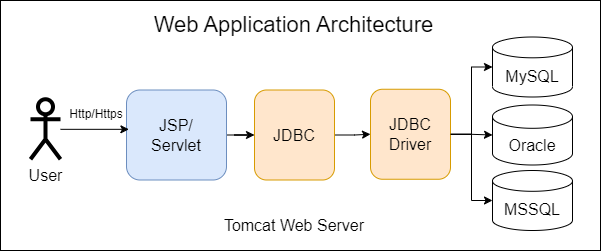The syllabus for Advanced Java covers a range of
topics that build on the foundational knowledge of
Core Java, delving into more complex and specialized
areas.
1. Networking in Java
- Basics of Networking
- TCP/UDP/IP Protocols
- Socket Programming
- Client-Server Programming
2. Java Database Connectivity(JDBC)
- Introduction to JDBC
- JDBC Drivers
- Database Connectivity
- Executing SQL Queries
- Transaction Handling
- Calling Stored Procedure and Functions
- Data Connection Pool
3. JSP/ Servlet
- Introduction to JSP and Servlets
- Servlet Lifecycle
- Handling Requests and Responses
- Session Tracking
- Using Cookies
- Filters and Listeners
- MVC Architecture in Web Applications
4. Web Technologies
- HTML: Basics, Forms, and Elements
-
JavaScript: Introduction, Functions, and DOM
Manipulation
- CSS: Styling, Layouts, and Responsive Design
5. Server Configuration
- Introduction to Server Configuration
- Configuring MySQL Database
- Setting Up Tomcat Server
- Deploying Applications on Tomcat
- Overview of JBoss Server
6. Hibernate Basics
- Introduction
- Basics of Hibernate
- Configuring Hibernate
- Hibernate CRUD Operations
- HQL (Hibernate Query Language)
- Hibernate Transactions
7. JUnit
- Introduction to Unit Testing
- Setting Up JUnit
- Writing Test Cases
- Assertions in JUnit
- Test Suites
- Mocking and Stubbing
8. Java Mail API
- Introduction to Java Mail API
- Sending Emails with Java Mail
- Receiving Emails
- Handling Attachments
9. Resource Bundle and Internationalization (I18n)
- Introduction to Resource Bundles
- Creating and Using Resource Bundles
- Internationalization Concepts
- Localizing Applications
- Handling Multiple Locales
10. Log4j
- Introduction to Logging
- Configuring Log4j
- Log4j Levels and Appenders
- Writing Log Messages
- Managing Log Files
11. Capstone Project
- Project Definition and Requirements
- Designing the Application
-
Implementing Features Using Advanced Java Concepts
- Testing and Debugging
- Deployment and Presentation
12. Additional Topics
- Best Practices in Java Development
- Performance Tuning and Optimization
- Security Considerations in Java Applications
Conclusion
- Summary of Advanced Java Concepts
-
Best Practices for Enterprise Application
Development
- Resources for Further Learning
This syllabus provides a comprehensive overview of
Advanced Java, covering essential topics required for
developing sophisticated and scalable Java
applications.


